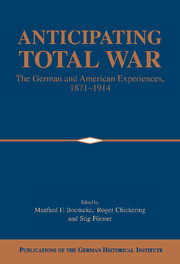Book contents
- Frontmatter
- Introduction
- Part One Germany, The United States, and Total War
- Part Two War and Society
- 3 The Political Economy of Warfare in America, 1865-1914
- 4 Hugo Stinnes and the Prospect of War Before 1914
- 5 War Preparations and Ethnic and Racial Relations in the United States
- 6 Religion and War in Imperial Germany
- 7 Socializing American Youth to Be Citizen-Soldiers
- 8 Preparing German Youth for War
- 9 Heroes and Would-Be Heroes: Veterans' and Reservists' Associations in Imperial Germany
- 10 Mobilizing Philanthropy in the Service of War: The Female Rituals of Care in the New Germany, 1871-1914
- Part Three Memory and Anticipation: War and Culture
- Part Four The Experience of War
- Index
5 - War Preparations and Ethnic and Racial Relations in the United States
Published online by Cambridge University Press: 05 January 2013
- Frontmatter
- Introduction
- Part One Germany, The United States, and Total War
- Part Two War and Society
- 3 The Political Economy of Warfare in America, 1865-1914
- 4 Hugo Stinnes and the Prospect of War Before 1914
- 5 War Preparations and Ethnic and Racial Relations in the United States
- 6 Religion and War in Imperial Germany
- 7 Socializing American Youth to Be Citizen-Soldiers
- 8 Preparing German Youth for War
- 9 Heroes and Would-Be Heroes: Veterans' and Reservists' Associations in Imperial Germany
- 10 Mobilizing Philanthropy in the Service of War: The Female Rituals of Care in the New Germany, 1871-1914
- Part Three Memory and Anticipation: War and Culture
- Part Four The Experience of War
- Index
Summary
Ethnic and racial issues in the United States were most closely related to the theme of total war during the period from American entry into World War I in 1917 through the mid-1920s, when the mobilization of the population for war produced a demand for 100 percent Americanism and the Espionage and Sedition acts, followed by the Red Scare, race riots, the revival of the Ku Klux Klan, immigration restriction, and the executions of Nicola Sacco and Bartolomeo Vanzetti. North Americans are still periodically reminded of this era - whether by living through the McCarthy era of the early 1950s, experiencing the Trudeau governments invocation of the War Measures Act in Canada in 1970, or simply by driving through Kitchener, Ontario, and remembering that it was formerly named Berlin.
A great deal has been written about the Americanization crusade, darkening attitudes toward German Americans and Irish Americans, and the preparedness movement in the years leading up to American entry into the war, but little has been written on how the military's relationships with ethnic and racial minorities and American expansion overseas relate to increasingly negative attitudes toward minorities within the United States. In addition, the attitudes of ethnic and racial minorities themselves toward the wars and war scares of the pre-World War I period have not been adequately explored, and almost nothing has been written comparing the Canadian and American experiences. It is my purpose in this chapter to assess the role that these factors played in the gradual triumph of a more restrictive and ultimately ominous side of e pluribus unum, when most Americans became convinced that group loyalties were incompatible with loyalty to the nation.
- Type
- Chapter
- Information
- Anticipating Total WarThe German and American Experiences, 1871–1914, pp. 97 - 124Publisher: Cambridge University PressPrint publication year: 1999

